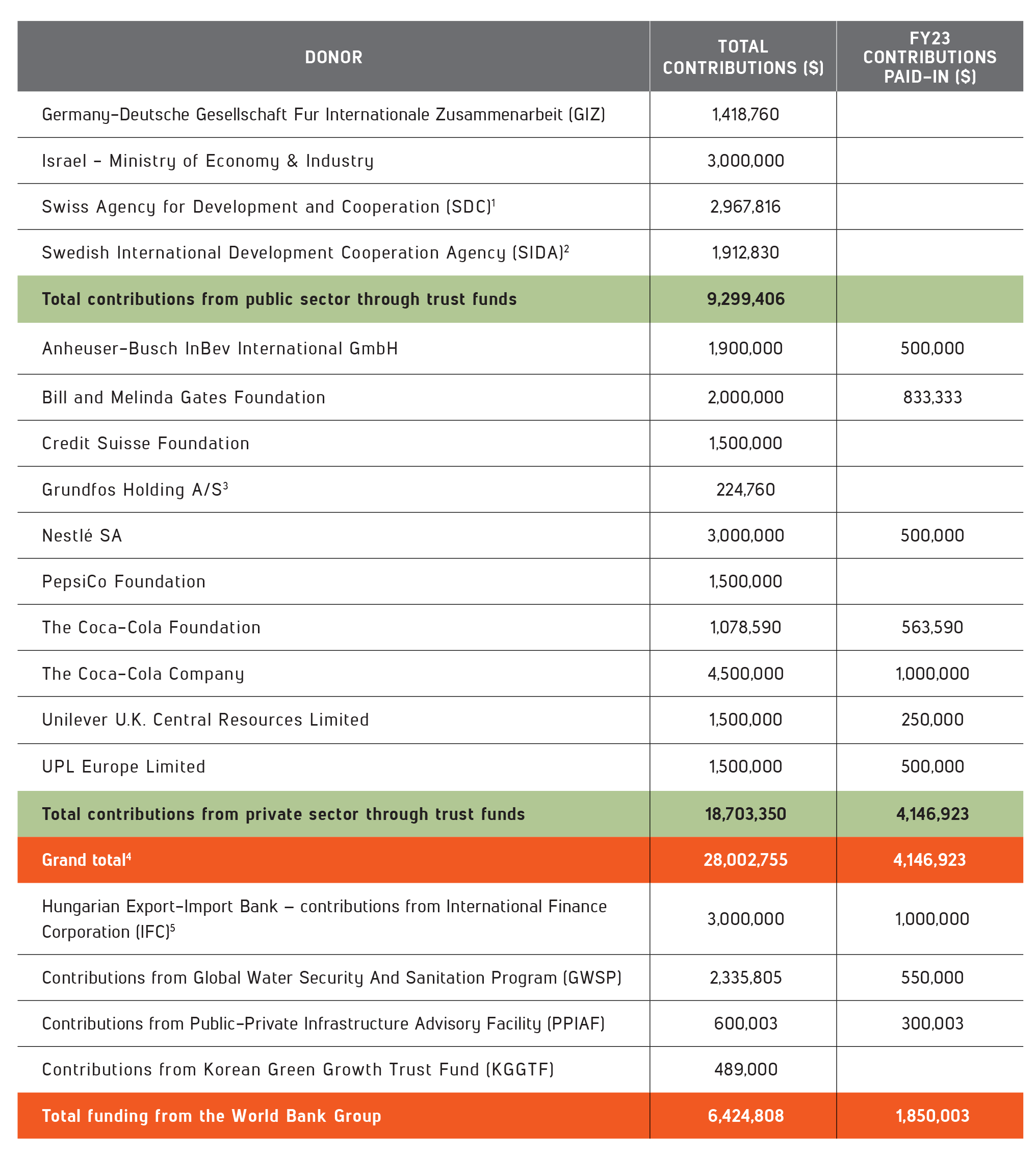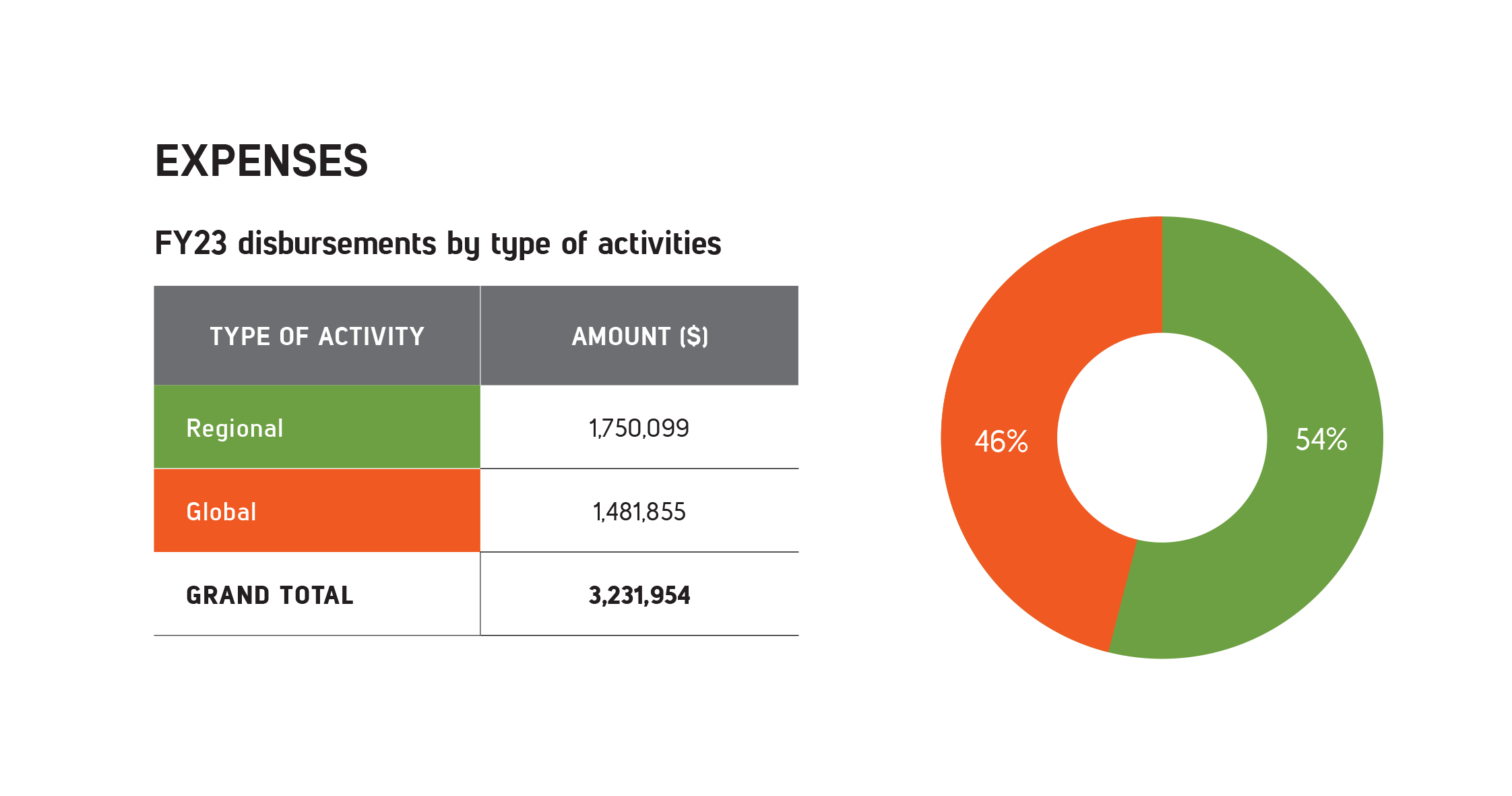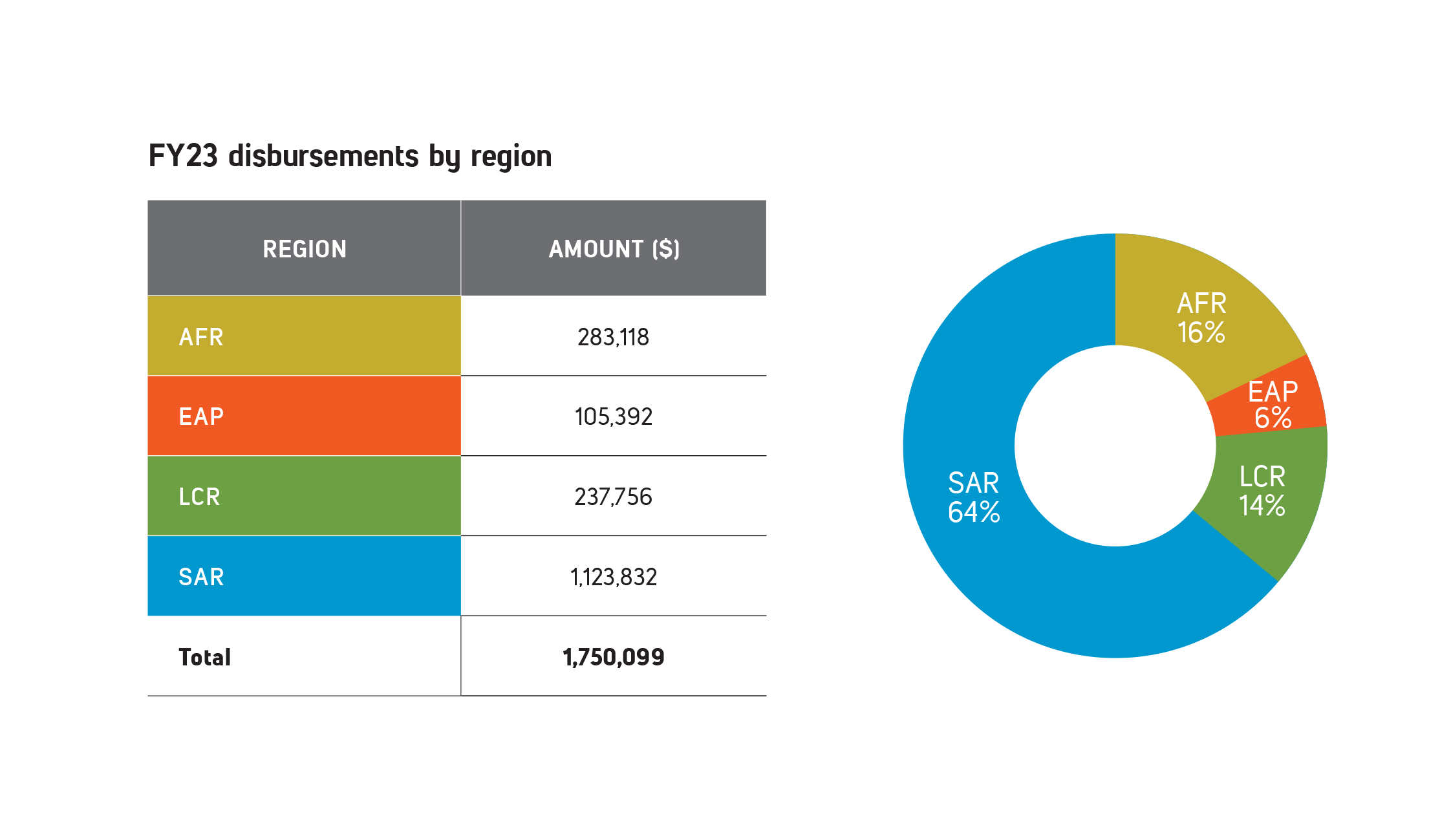ANNUAL REPORT
Welcome to the 2030 Water Resources Group Annual Report.
The reporting period is 1 July 2022 to 30 June 2023.
Download the Executive Summary here
OUR VISION
To enhance water security through public-private-civil society partnerships
Governing Council Co-Chairs Paul Bulcke and Juergen Voegele reflect on the past year and their vision to enhance water security through public-private-civil society partnerships in the years to come.
Message from the co-chairs

Paul Bulcke
We live in a time of constant change. In the last year, the 2030 Water Resources Group has adapted how we do our work in response to these changes.
The result is our new strategic plan for 2023 to 2025.
In 2008 we developed a study that identified a 40 percent gap between water supply and demand by 2030. Today, this gap has reached 56 percent, according to the World Resources Institute.
It is more important than ever that we continue our work to make sure that there is enough water for people and the planet.
Channeling urgent public-private action to meet these challenges, our strategic plan gives new focus and momentum to 2030 WRG. Using our limited resources wisely to capitalize on the learnings from the last decade, 2030 WRG is supporting transformational programs around the world, building on the World Bank’s reach and impact.
We will focus on using collective action and partnership approaches in the next phase of activity from 2023-2025, with the aim of helping countries meet the water-related Sustainable Development Goals and address the impacts of climate change.
We also aim to contribute new knowledge and thought leadership on critical themes, and drive innovation, to accelerate the pace of implementation on water security, both through our own work and that of our partners.
This executive summary provides a snapshot of what we have already achieved under this strategy.
Juergen and I wish to thank our global Governing Council, and Steering Board members for their renewed commitments to the innovative and focused efforts of 2030 WRG’s program for the next three years.

Juergen Voegele
The World Bank is aiming to support more sustainable, inclusive, and resilient growth through its Global Challenge Programs.
2030 WRG’s work fits well into this vision of building partnerships, and scaling up financing and innovation for greater impact.
This year, 2030 WRG has been an essential part of a significant collaboration across the World Bank to create a strategic framework for scaling up finance for water. It is the first effort by the World Bank (including 2030 WRG, the International Bank for Reconstruction and Development, the International Development Association, the International Finance Corporation, and the Multilateral Investment Guarantee Agency) to jointly engage on programmatic- and project-level opportunities in the water sector, unlocking private sector expertise, innovation, and capital, to contribute towards water security and long-term development objectives.
Paul and I are grateful to our in-country partners around the globe. Many of them have already made great strides in the areas of water-efficient technologies in wastewater and climate-smart agriculture, for example, and in other inspiring solutions, including innovative financing mechanisms.
The agri-water accelerator from Uttar Pradesh, India, for example, leverages government programs while mobilizing private finance to support 1 million small and marginal farmers as they adopt sustainable and climate-smart innovations for water management. The accelerator is enhancing incomes, improving agricultural productivity, and reducing the water and emissions footprint in agriculture.
I look forward to another year of making impact together, working at a local level while sharing global lessons.
HIGHLIGHTS
Setting priorities
2030 WRG’s strategic plan has been endorsed and a new program manager has been appointed.
The Governing Council and Steering Board have endorsed 2030 WRG’s strategic plan for 2023 to 2025. A new program manager, Michael John Webster, has been appointed to lead 2030 WRG as it steps up to face ever more urgent water challenges. The new strategic plan aims to catalyze greater impact through accelerator programs which will leverage both public and private sector capacities, financing, and expertise. Also in the last year, several projects—in Brazil, Mexico, and Peru—reached maturity, or segued into other programs.
Identifying core programs and partnerships for impact
To catalyze impact at a meaningful scale, our work from this year to 2025 will focus on a core program in each country, working jointly with local stakeholders.
2030 WRG is working through accelerators and pre-accelerators on themes that support our strategic aims. In 2023, we launched accelerators in India, Bangladesh, South Africa, and Kenya, along with early work in Ethiopia and Kazakhstan. These accelerators are structuring innovative partnerships and solutions for systems change in the water sector. In Bangladesh, for example, the country’s funding gap for water pollution management, expected to reach $6.6 billion by 2040, is too big to be met by public funding alone. 2030 WRG is bringing public and private stakeholders together to fast-track investments, including $450 million in public finance and $100 million in private capital, to help address the urgent water pollution challenge in Bangladesh. These models are being developed as replicable solutions that the government can fast-track for implementation in the future.
Linking water and climate change
In FY 2023, our work to address water challenges became more climate oriented than ever before.
Water is at the center of the climate crisis: climate change is severely disrupting the water cycle on which people and the planet depend, and nine out of 10 climate events are water related. 2030 WRG’s work on water security is closely linked to climate action, contributing to global efforts to reduce carbon emissions and achieve net zero goals. Our accelerator programs align with SDG 6 on clean water and sanitation and SDG 13 on climate action, enabled through collective action (SDG 17 on partnerships).
For example, in a program under our Uttar Pradesh (UP) accelerator in India, 2030 WRG is working closely with the International Rice Research Institute and private sector partners to increase farmer uptake of low-carbon rice and wheat cultivation practices. These approaches save water while producing less methane. 2030 WRG is supporting large-scale adoption of low-carbon cultivation approaches by mobilizing funds from the private sector, building capacity at the local level, and supporting access to relevant technologies.
In water-stressed South Africa, the final results of a multi-year hydro-economic study for the Western Cape was launched by 2030 WRG and its partners in June 2023. The report, which demonstrates the importance of water security for sustainability and growth, is based on extensive partnership building and dialogue. In FY23, the accelerator worked towards partnering with provincial and national government in South Africa’s other provinces to incorporate this type of analysis nationally. Links with other World Bank programs are being explored, for example, assessing the potential uses of freed up water from a decarbonization program in Mpumalanga province, where the World Bank has loaned $497 million to the national power facility to decommission a coal-fired turbo-electrical power plant.
Working more closely with the World Bank
2030 WRG continues to work closely with the World Bank and the World Economic Forum—our current and past host—drawing on the World Bank’s knowledge and financing experience in developing countries, and the World Economic Forum’s convening strengths. In FY23, we played a significant role in establishing a framework for financing water sector investments for the entire World Bank.
The Scaling Up Finance for Water Strategic Framework, which was finalized in 2023, is an example of what can be gained through such collaboration. Each water-related operation or activity in the World Bank is expected to align with this framework.
Focusing on finance and innovation
Water security and climate action both require financing and innovation. 2030 WRG supports these themes in its enabling and partnership work.
2030 WRG’s work on enabling conditions and partnerships focuses on the planning, mobilization, and efficiency of funding and financing for water sector investments. 2030 WRG supports public-private collaboration for innovative approaches to increase financing and maximize the impact of existing resources: it does this by working on reforms to policies, regulations, and institutional frameworks at a country level, as well as the design of new financing and economic instruments. At the same time, 2030 WRG aims to share its knowledge of global best practice and support its adoption locally. Meeting the global financing needs for water is a particularly big challenge. Water infrastructure is estimated to require $6.7 trillion by 2030—and $22.6 trillion by 2050. Yet the global water sector currently attracts less than 2 percent of public spending, with a similar level of private investment in low- and middle-income countries. More financing is needed, alongside more innovative approaches.
For example in Kenya, the accelerator is working with the World Bank’s Water Global Practice to facilitate $10 million through a financing facility for improved operational efficiency and WASH service delivery, targeting public water service providers and WASH service providers. Operational efficiency will improve creditworthiness of water service providers and enhance their eligibility for commercial financing, helping to close an investment gap of $8.32 billion (2023 to 2030) as estimated in the Kenyan government’s National Water and Sanitation Investment Plan. Lessons learnt from the financing facility will be a reference for and catalyze the development of innovative models to attract additional commercial financing to the water sector. The accelerator also targets a cumulative reduction of municipal water losses from 40 percent to less than 25 percent, with access to WASH services for 2 million people. The targets will be facilitated jointly through World Bank operations.
SPECIAL FOCUS:
A framework for water finance
The World Bank’s vision is to create a world free of poverty on a livable planet, supporting impactful development that is inclusive, resilient, and sustainable, including through access to clean water.
With this goal in mind, different parts of the World Bank, including IBRD, IDA, IFC, MIGA, and 2030 WRG, have committed themselves to scaling up finance for water-related investments in emerging and developing economies, focusing specifically on crowding in additional private sector innovation, expertise, and capital into a sector that has been historically funded through public and concessional financing in most of the developing world.
The Scaling Up Finance for Water Strategic Framework provides a set of strategic directions and a customizable roadmap for the public sector, private sector, international organizations, intermediaries, and others to collaborate towards catalyzing greater financing and innovation for the water sector. This builds on the collective experience and knowledge of the World Bank and development partners in addressing the barriers to mobilizing additional resources in the sector.
IMPACT STORIES
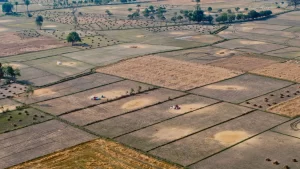
Water for Food:
Climate Smart Agriculture
Climate smart agriculture embraces agricultural practices that increase agricultural productivity, support water use efficiency, and reduce carbon emissions.
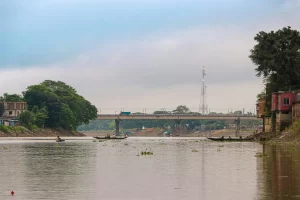
Water for Environment:
Water Pollution Management
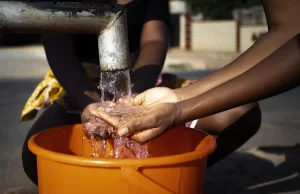
Water for Cities:
Resilient Water Systems
This theme covers 2030 WRG work on nature-based solutions and other innovative solutions to match water supply and demand in the context of urban centers and regional water systems.
IMPACT STORIES
THEME 1: WATER FOR FOOD
CLIMATE SMART AGRICULTURE
Climate smart agriculture embraces agricultural practices that increase agricultural productivity, support water use efficiencies, and reduce carbon emissions.
THEME 1: CLIMATE SMART AGRICULTURE
The PRAGATI Accelerator, Uttar Pradesh, India
The state of Uttar Pradesh (UP) is a leading producer of a wide variety of crops, including food grains that make up almost 18 percent of India’s overall production (2019–2020). But most of the land is farmed by small and marginal farmers, who are particularly vulnerable to climate change.
To support the state’s agricultural transformation, the UP Accelerator PRAGATI (Program for Agricultural Transformation and Increased Incomes) was approved by a cabinet order in December 2022—Pragati means progress in Sanskrit. The accelerator, which was conceptualized through extensive discussions among 2030 WRG, the government of UP, and key stakeholders from the private sector and civil society, is helping 1 million farmers improve their incomes and enhance sustainable agriculture and water management practices across key crop value chains in the state.
The program is expected to result in the adoption of improved water use efficiency techniques and climate-resilient water management covering an area of 1 million hectares in UP. It focuses on aligning with government activities and leveraging private sector partnerships and financing to reduce the water footprint and agricultural emissions, and improve agricultural productivity and agricultural incomes.
Key components of the accelerator are highlighted in the full story.
THEME 1: CLIMATE SMART AGRICULTURE
Farmer-led irrigation development, Ethiopia
Farmer-led irrigation development (FLID) enables small-scale farmers to become more productive and profitable while improving their resilience to climate change. In Ethiopia, 2030 WRG, working with the International Water Management Institute, has supported dialogue for an Ethiopian Ministry of Agriculture program—the Food Systems Resilience Program for Eastern and Southern Africa, which is moving into the implementation phase. The program aligns with World Bank operations on food security and climate resilience and has the World Bank as the main financier.
Overall, the Ethiopian program plans to develop 35,000 hectares of small-scale irrigated farmland, of which 12,000 hectares will be rehabilitated, 7,000 hectares will be new and, 16,000 hectares will involve FLID. The FLID portion is expected to benefit over 60,000 households, including women farmers.
THEME 1: CLIMATE SMART AGRICULTURE
Introducing water-efficient technologies, Bangladesh
In the water-scarce Barind tract in Bangladesh, 2030 WRG is working directly with farmers on an agri-water management project that introduces innovative water-saving technology and production methods for mango and rice. The work, which started in 2018, is in partnership with The Coca-Cola Foundation. The project aims to reduce the demand for groundwater during production to generate significant water savings while helping to lower carbon emissions.
To address the whole value chain, the Introducing Water-Efficient Technologies (IWET) project operates around a network of farmer hubs that provide agricultural backward and forward linkages. Sixty of these farmer hubs are operating in the Barind region.
IMPACT STORIES
THEME 2: WATER FOR ENVIRONMENT
WATER POLLUTION MANAGEMENT
2030 WRG’s work on pollution management includes supporting changes to the enabling environment; building partnerships of stakeholders; and working to bring innovative financing to pollution management projects.
THEME 2: WATER POLLUTION MANAGEMENT
Water pollution management, Bangladesh
In Bangladesh, 2030 WRG is engaged in a water pollution management accelerator to support the implementation of the government’s Bangladesh Delta Plan 2100, a long-term 100-year visionary plan for strategic interventions for the largest delta in the world.
2030 WRG in Bangladesh, under its water pollution management accelerator program, works to mainstream water pollution management by mobilizing both private sector capital and expertise, with the private sector also providing a climate change mitigation and adaptation perspective. The accelerator has both municipal and industrial wastewater management as design pillars. A third pillar, that cuts across both, is innovative financing mechanisms—looking at financing opportunities that go beyond conventional financing.
THEME 2: WATER POLLUTION MANAGEMENT
Leveraging public funding to mobilize private capital for decentralized sanitation and operational efficiency, Kenya
In Kenya, an ambitious National Water and Sanitation Investment Plan (NAWASIP) seeks to raise funds for achieving universal access to water and sanitation by 2030. The plan estimates the investment gap to be $8.32 billion (2023 to 2030). In support of the plan, the Kenyan accelerator aims to facilitate $10 million through a financing facility for operational efficiency in public water service providers and enhanced WASH service delivery. It targets a cumulative reduction of municipal water losses from 40 percent to less than 25 percent, with access to WASH services for 2 million people. The targets will be facilitated jointly through World Bank operations.
IMPACT STORIES
THEME 3: WATER FOR CITIES
RESILIENT WATER SYSTEMS
This theme covers 2030 WRG work on nature-based solutions and other innovative solutions to match water supply and demand in the context of urban centers and regional water systems.
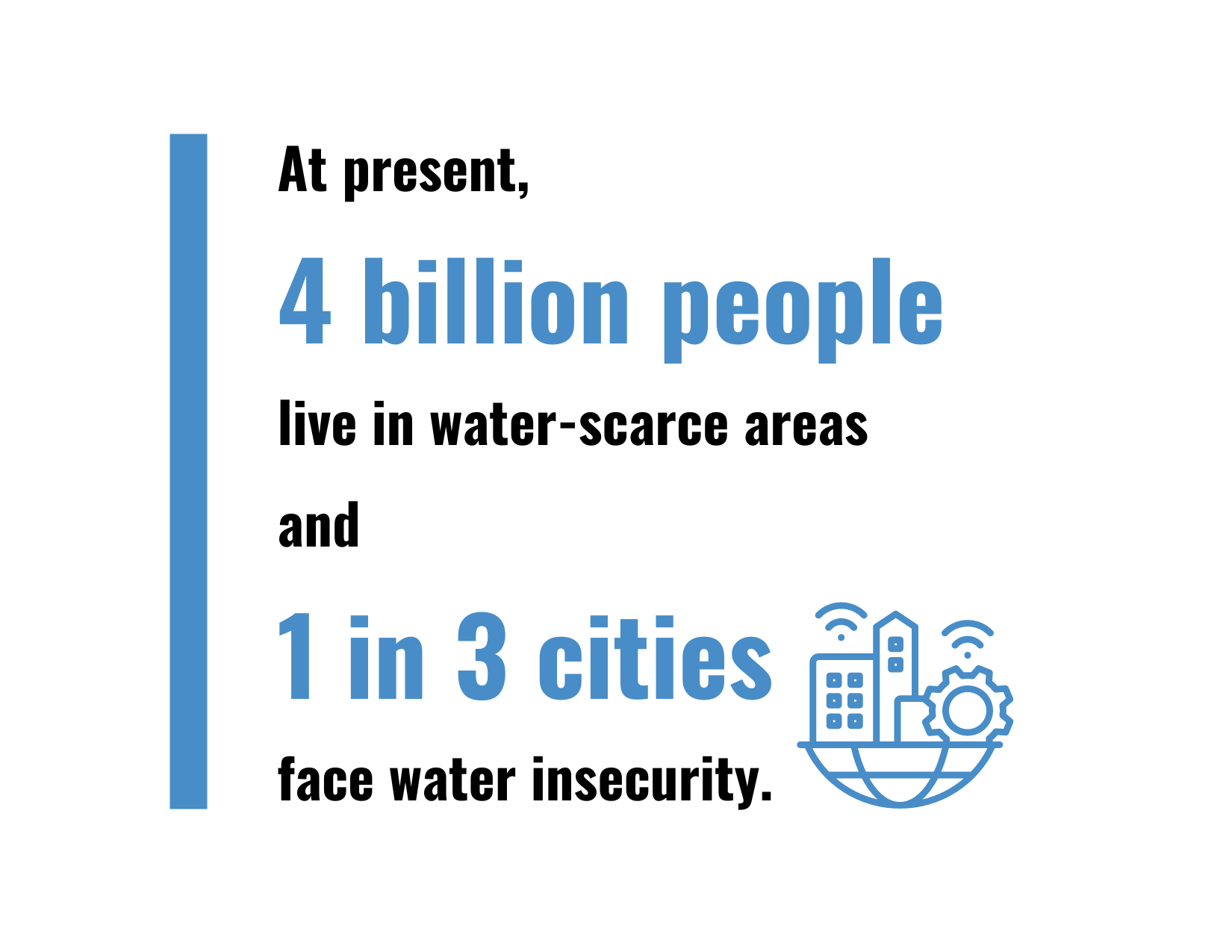
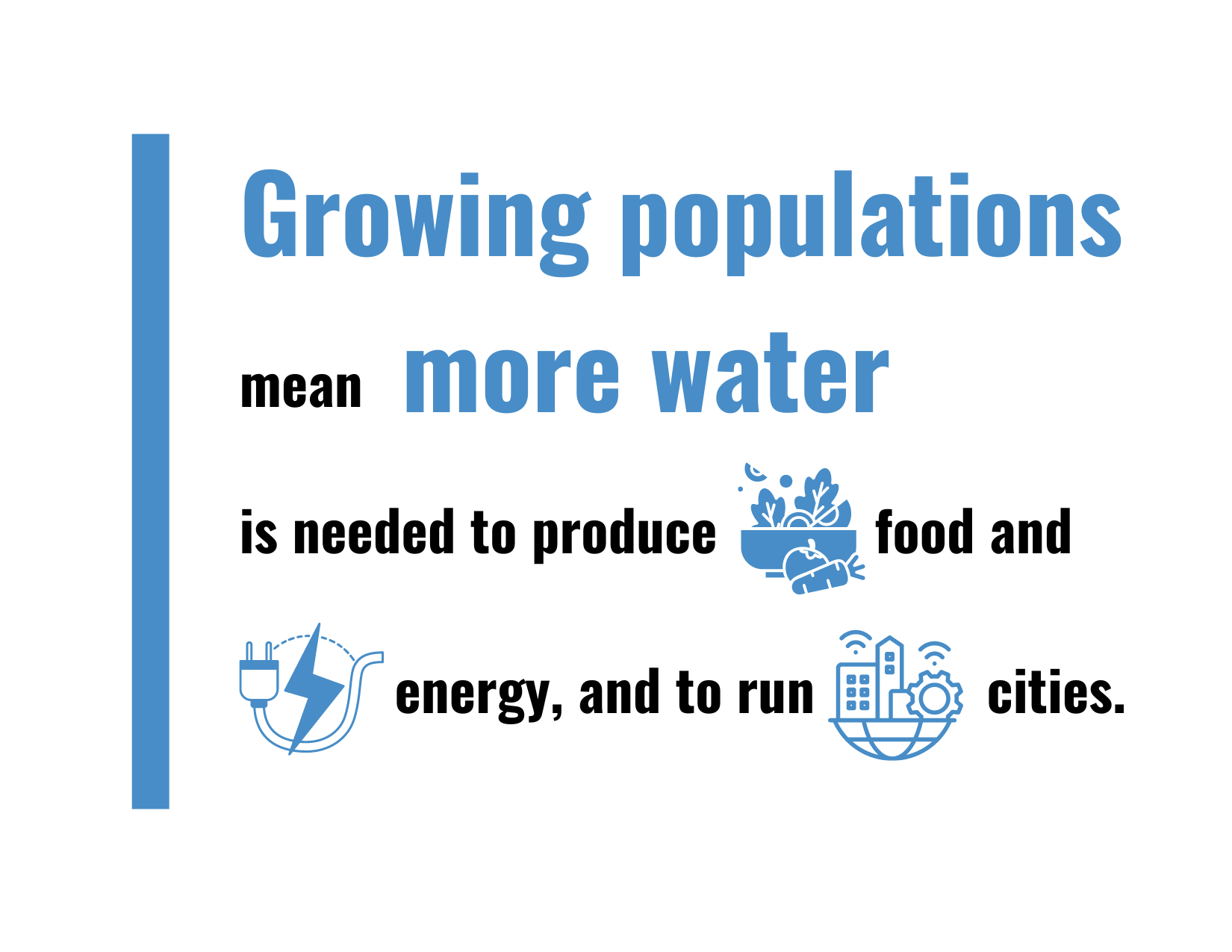
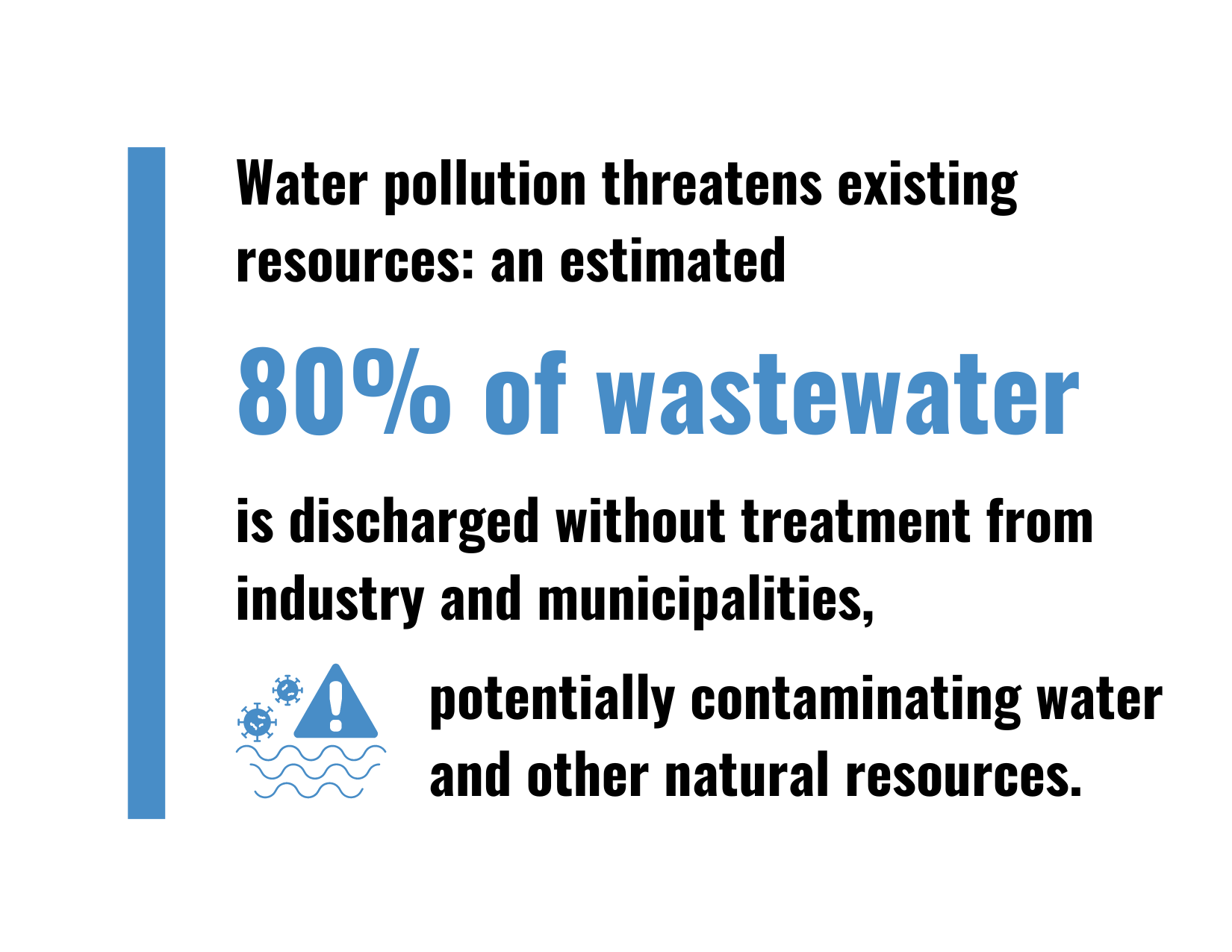
THEME 3: RESILIENT WATER SYSTEMS
Nature-based solutions, South Africa
South Africa is a water-stressed country, and understanding linkages between its economy and water is key to its future. The final results of a multi-year hydro-economic study (HES) for the Western Cape water supply system, which demonstrates how central water security is for sustainability and growth, was launched by 2030 WRG and its partners in June 2023. The report provides an analysis of financing options for water augmentation in the system and recommends prioritizing nature-based solutions for water security for the City of Cape Town.
Built around partnership building and dialogue on water security and economic growth, the Cape Town HES also demonstrates the value of such a piece of work for other parts of the country. During the launch of the report in FY23, the 2030 WRG accelerator worked towards partnering with provincial and national government in South Africa’s other provinces on incorporating this type of analysis in a more systematic manner nationally. It sought inputs from key players, including the National Treasury and the Department of Water and Sanitation, which are responsible for economic policy and water resources management respectively. 2030 WRG engaged consultants Pegasys Strategy and Development to manage this in-country work, with a report deadline set for the middle of FY24.
THEME 3: RESILIENT WATER SYSTEMS
Early-stage accelerator on water scarcity and access, Kazakhstan
2030 WRG has begun initial engagement at the request of the government of Kazakhstan to establish a multi-stakeholder platform to address water security needs in the country.
These needs will be defined by the government of Kazakhstan, which aims to achieve the SDGs—notably SDG 6 on clean water and sanitation and SDG 13 on climate action, along with climate-related commitments and other obligations. Improving drinking water and supply and water canalization is central to the government’s strategy.
This research, including a diagnostic review and report that was completed shortly after the period under review, in July 2023, has been undertaken by the Corvinus University Center for Central Asian Research in Budapest. Ongoing research and support by the Corvinus team will establish an implementation roadmap for the 2030 WRG work team, providing support for strategy development and partnerships.
In line with 2030 WRG’s new strategy, the research will support the accelerator to: develop and implement projects that support public-private-civil society cooperation, including through PPPs; establish a consultative group to work on the structural and institutional reforms required for greater private sector participation in the water sector; and set up an advisory board to support high-level decision-making both by generating knowledge and by sharing global best practice.
ABOUT 2030 WRG
The 2030 WRG vision is to advance water security through public-private-civil society partnerships.
How we work
We work globally to position water security and climate action as development priorities.
Locally, 2030 WRG engages in country initiatives that focus on models of public-private engagement. We bring together partners from various sectors to identify and develop innovative solutions and financing for water challenges. We catalyze public-private collaboration to help develop and implement water security and climate action plans.
Our approach is focused around three pillars as a critical response to climate change:
- Water for food
- Water for environment
- Water for cities
2030 WRG is driven by the following principles:
Lifting institutional barriers
Break down silos in the water sector, within and across public sector institutions, including different ministries and departments; civil society; academia; international organizations; the private sector; and others.
Facilitating cross-sectoral alignment
Create cross-sectoral alignment, facilitating synergies beyond the water sector with other sectors, such as agriculture, urban development, rural development, energy, environment, and others.
Supporting reforms to policies, practices, and mindsets
Support changes in water-related policies, regulations, governance, and practices.
Serving as a neutral broker
Bring different, often competing, partners together and create a neutral space for collective action and reform
Accelerating towards transformation
With water resources under even more pressure as the climate challenge mounts, 2030 WRG has launched a strategic plan for 2023 to 2025. We aim to accelerate towards transformation in the phase ahead, through accelerators that deliver concrete impact.
Focusing on finance and innovation as we partner for change
More global financing for water is needed, alongside more innovative approaches to maximize the impact of funds. In this phase, we will collaborate more closely with the World Bank and World Economic Forum to catalyze private sector participation in the water sector, following the roadmap set out in the Scaling Up Finance for Water Strategic Framework.
Working through country platforms
2030 WRG’s success lies in its country platform model, which brings a range of partners together from various sectors to discuss, engage, and cooperate for better water management. The platforms put ownership in the hands of the stakeholders, with 2030 WRG acting as a support in the process of finding solutions. This collective action is critical for achieving water security. We want to strengthen each of our country platforms to enable them to become more inclusive, transparent, and accountable, with an emphasis on achieving results. These platforms are the core instrument for convening stakeholders at the national level: they enable the implementation of a co-created roadmap for change. With our network composed of private sector partners, public sector entities, and civil society organizations, we are well positioned to make an impact.
Creating leverage through 2030 WRG country platforms
Networked coalition for public-private-civil society collaboration
Pre-competitive spaces for innovation at scale
Global-local reach and impact
2030 WRG VALUE PROPOSITION
2030 WRG plays a unique role as a convener and catalyst for systems reform.
2030 WRG-led community to support reforms, increase operational capacity for service delivery and water management, and ensure sustainability (COS).
Accelerating upstream enabling environment reforms for private capital mobilization and innovations.
Developing collaborative platforms across government, private sector, and civil society
Advancing innovation in water management
Strengthening institutional capacities
PARTNERS
In FY23 2030 WRG was supported by:
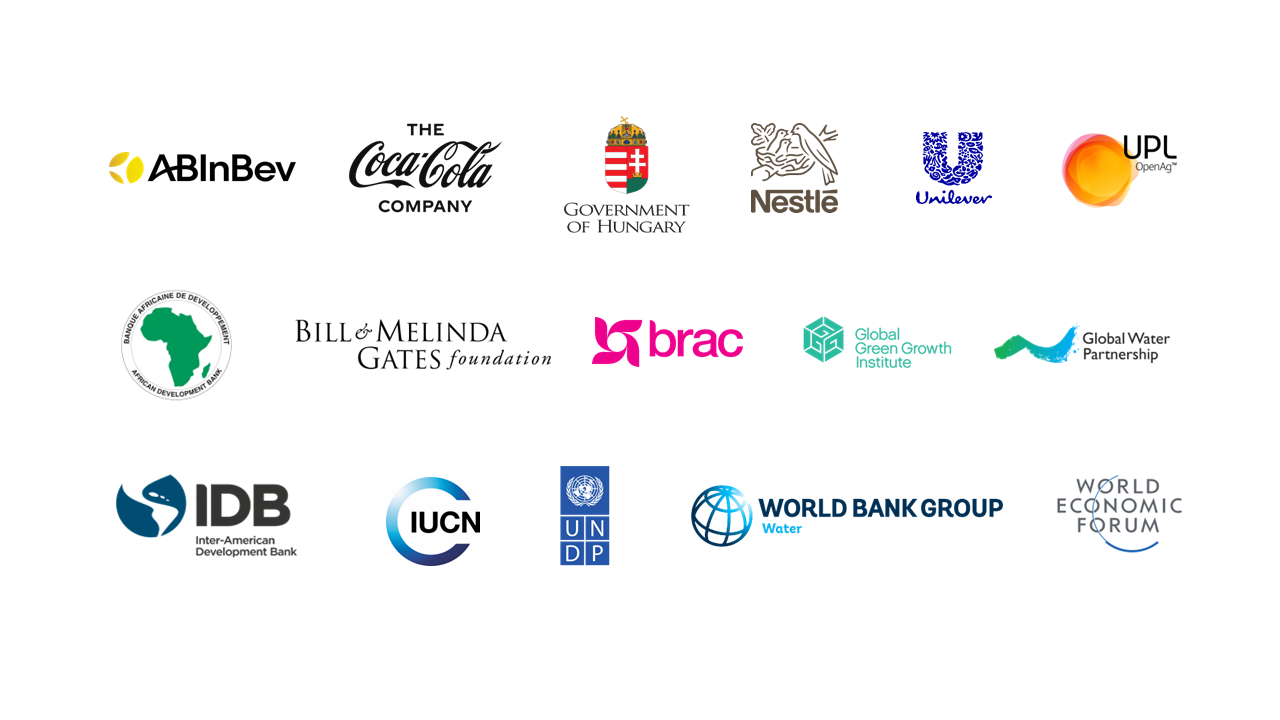
GOVERNANCE
2030 WRG’s governance structure comprises a Governing Council, Steering Board, and Secretariat.
Members of the Governing Council FY23
2030 WRG’s governance structure comprises a Governing Council, Steering Board, and Secretariat. The Governing Council consists of senior executives of development partners, who provide guidance on the strategic direction of 2030 WRG. They also help to promote 2030 WRG and its activities within their extensive networks.
- Paul Bulcke, Chairman Board of Directors, Nestlé/Co-Chair, 2030 WRG Governing Council
- Juergen Voegele, Vice President for Sustainable Development, World Bank/Co-Chair, 2030 WRG Governing Council
- Akinwumi Adesina, President, African Development Bank
- Alan Jope, CEO, Unilever (Hein Schumacher started 1 July 2023)
- Asif Saleh, Executive Director, BRAC International
- Bruno Oberle, Director-General, International Union for Conservation of Nature
- Ezgi Barcenas, Chief Sustainability Officer, AB InBev
- Frank Rijsberman, Director-General, Global Green Growth Institute
- Gim Huay Neo, Managing Director, Centre for Nature and Climate, World Economic Forum
- Paulo Bereciartua, Chair, Global Water Partnership
- Jai Shroff, Group CEO, UPL Limited
- James Quincey, President & CEO, The Coca-Cola Company
- James Scriven, CEO, Inter-American Development Bank Invest
- László Balogh, Deputy State Secretary of Financial Public Affairs, Ministry for National Economy, Government of Hungary (Tibor Tóth, State secretary for Macroeconomics and International Affairs, Government of Hungary)
- Senzo Mchunu, Minister of Water and Sanitation, Government of South Africa
- Usha Rao Monari, Under-Secretary-General & Associate Administrator, United Nations Development Programme
Members of the Steering Board FY23
The Governing Council appoints the members of the Steering Board, which oversees the management of 2030 WRG. The Board supervises the Secretariat; approves its plan, budget, and proposed country programs; supervises funding and resource development within countries; and comments on 2030 WRG’s work program.
- Saroj Kumar Jha, Global Director, Water Global Practice, World Bank/Co-Chair, 2030 WRG Steering Board
- Gim Huay Neo, Managing Director, Centre for Nature and Climate, World Economic Forum/Co-Chair, 2030 WRG Steering Board
- Alice Laidlaw, Global Head, Cities and Environment Infrastructure—International Finance Corporation (IFC) (Sumeet Thakur, Global Head of Water, Waste and Cities at the International Finance Corporation on the Steering Board starting September 2023)
- Andre Fourie, Global VP of Sustainability, AB InBev
- Paulo Bereciartua, Chair, Global Water Partnership
- Gábor Németh, Head, Department for Water Diplomacy & Tied Aid Credits, Deputy State Secretariat for External Economic Relations, Ministry of Foreign Affairs & Trade of Hungary
- Ferhat Soygenis, Global Head of Communications Operations & Deployment—Assistant Vice President, Nestlé
- James Dalton, Director, Global Water Programme, International Union for Conservation of Nature
- Michael Goltzman, Vice-President, Global Public Policy and Sustainability, The Coca-Cola Company
- Michael John Webster, Program Manager, 2030 WRG
- Thomas Lingard, Global Head of Sustainability—Environment, Unilever.
FINANCIAL SUMMARY (UNAUDITED)
2030 WRG obtains funding from a variety of development corporations, public sector trusts, and private sector institutions. The bulk of these funds support the functioning of the country platforms and accelerator programs in countries, while a small percentage covers operational support provided by the Global Secretariat.

